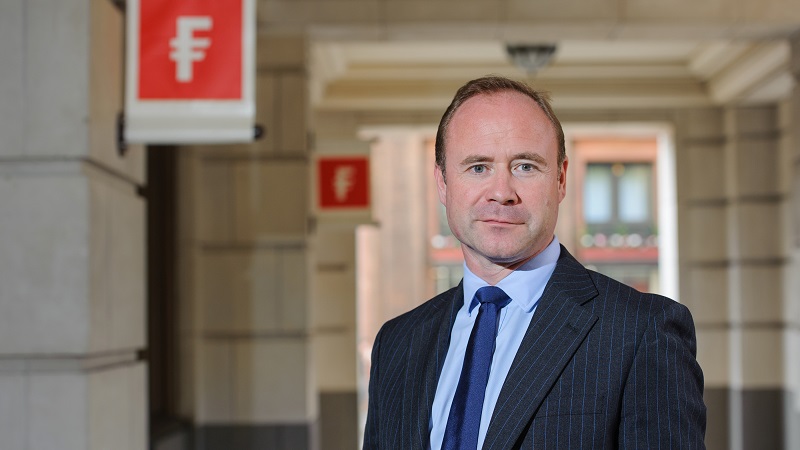Corporate golf days and long boozy lunches were killed off by the retail distribution review long before lockdown kicked in, so the Covid-driven shift to a world in which fund distribution is done over Zoom has not come as a big shock to most asset managers. But as we enter the new normal of how funds are bought and sold, what does the landscape look like and what methods are fund groups using to keep clients engaged?
In addition to RDR, regulatory pressure from other areas has put costs, charges and value for money in the spotlight. According to a recent survey by Calastone, 73% of industry participants from across Europe think the burden of growing margin pressure will be felt most acutely by fund promoters.
Add in the coronavirus pandemic and selling funds becomes trickier still, but Fidelity International reported record amounts of business in the first quarter of this year. Elevated levels of market activity as a result of the sell-off and some big-name manager moves helped, but reacting quickly when lockdown kicked in also set the firm in good stead.
According to Fidelity International head of UK wholesale John Clougherty, the company made a call at the start of the crisis to be “the most visible asset manager in the market”.
Clougherty (pictured) says his experience of the tech crisis and the 2008 global financial crisis taught him that clients remember the fund groups that “stood up to be counted” and were proactive throughout those difficult periods.
“Over many years I’ve seen this happen time and time again and you never get that reputation back,” he says. “If you’re not available and not supporting IFAs when they need you, they never forget.”
He says the initial response was to do as much as the team possibly could for the intermediaries to make sure they felt supported. “We said every line has to be open, every email inbox must be monitored and we have to quickly rethink how we offer support.” Within two days of lockdown the firm had issued more than 30 webcasts to the market covering every asset class and had called every IFA to let them know how and where they could find information about funds and access managers.
Since the crisis took hold, Clougherty says the firm’s database of sales activity, whether phone calls or Zoom meetings, has gone “through the roof”. “We’re having more meetings or interactions than we’ve ever had.”
‘As much of the alpha is in the advice as it is in the investment management’
Lockdown has emphasised to fund groups the true value of sound financial advice within the whole distribution chain. Some groups have seen an opportunity to expand their distribution capabilities among intermediaries through mergers and acquisitions, by bolting on wealth management or advisory businesses. According to the Calastone survey, 59% of industry participants in Europe believe fund managers will expand their wealth management arms and increase their focus on direct-to-consumer channels.
In June, Pacific Asset Management (PAM) announced a strategic partnership with chartered financial planning firm Fidelius Group which saw PAM acquire Fidelius’s discretionary fund management arm, Parallel Investment Management, and its risk-targeted portfolios. In turn, Fidelius took on PAM’s financial planning arms, Chartered Financial Management and Zen Wealth.
PAM chief executive Matthew Lamb says the deal allows the firm to close the gap that exists between the asset manager and the end client. This, he believes, is something most fund groups have not taken seriously because they underestimate the value financial planning brings to the end client.
“It’s really difficult to build an asset management business over the next decade without understanding the consumer,” he says. “Asset managers as a whole have been far too arrogant about their capabilities and how they value their ‘secret sauce’ of alpha. We firmly believe that as much of the alpha is in the advice as it is in the investment management.
“Efficient tax planning and making sure people have enough to live on will make more money for the client than many asset managers will ever make.”
As such, a close relationship with the intermediary and making their job as easy as possible is crucial, he adds. “Having a good connection with the IFA means the end client will understand more about our thought process when we underperform, which inevitably will happen,” says Lamb. “They will then be more likely to stay where they are.”
Sanlam head of UK distribution Lawrence Cook also believes lockdown has emphasised the value of financial planning and the firm has taken steps to engage with the IFA community through a series of educational webinars. The first one provided LinkedIn training from a social media and PR expert while other sessions are likely to focus on more industry- specific topics.
“That’s about reaching out and saying, ‘Look, we’re all trying to do the same thing, to help each other out professionally’,” says Cook. “The more we can do as a series adding value, the better. I’m keen to get IFAs talking to other IFAs.”
Stay on top of technology to reach end client
Top-notch technology is crucial to closing the gap, reckons Lamb, but it also needs the distribution to back it. He points to robo-advisers, most of whom have mastered user engagement technology but fall short when it comes to getting in front of the end client. This is despite the Calastone survey revealing that 80% of respondents think robo-advice will expand as the funds industry seeks new ways of delivering investment advice.
“It’s like shampoo: everything in the bottle is the same, the only way you sell more of it is to buy more advertising and there just isn’t enough margin in the business to constantly be advertising everywhere. As a result, robo-advice has really struggled.”
Lamb points to the API – application programming interface – PAM has built between design software InDesign and its centralised database, which enables it to automate factsheet generation. “We automate about 500 of those a month,” says Lamb. “We do that in five to 10 minutes. You’d be surprised how many asset managers struggle, or outsource, the factsheet production because they can’t do it in-house.”
Digital events are the future
In-person events is one area of the industry that has had to adapt drastically as a result of the coronavirus pandemic. Fidelity’s Clougherty does not expect IFAs will attend any physical events in 2020. “We’ve got no plans to produce in-person conferences, so we are working with external digital conference providers to do virtual venue-based events and rethinking how we communicate,” he says.
But what challenges does this bring? How long are intermediaries likely to sit in front of a computer screen staring at presentations for?
Fidelity has addressed this by offering intermediaries flexibility in the sessions they wish to attend at its virtual events. “When we send out the invitation we make it really clear you can dial into any element you want, whereas normally you would be required to get up, get on a train or drive and have to attend all day. Plus, the whole conference will be available online for weeks afterwards.”
He adds: “I see digital-based events as a big part of the future. I can’t see companies welcoming salespeople and managers into their office for at least six months.”
The only real issue with virtual events is the networking that is usually done between scheduled sessions in the coffee and lunch breaks, says Clougherty. To address this, Fidelity is mulling the idea of creating Zoom call ‘coffee breaks’, in which delegates can jump on a separate call to chat about whatever they want to without the pressure of fund group representatives listening in.
“We are possibly going to allow attendees to have a conversation at the virtual event with no Fidelity presence, just like they would if they were in the coffee room, having a biscuit and a cup of tea. What happens a lot is you see groups of IFAs getting together and chatting about, for example, what their business is doing compared with the one down the road.”
Levelling the playing field with the ‘big boys’
SVM Asset Management chairman Colin McLean says since the pandemic started it has probably been easier to keep in touch with existing clients, but it is harder to win new business because digital communication makes it more difficult to kick off a new relationship. Like others, SVM has started to produce more video and blogs, and recently hired someone with a strong background in social media and video communications who can drive that process.
“We’ve got the tools to do that,” he says. “But I would say it is yet to be seen just how well that does in terms of getting new business, without face-to-face contact.”
Rathbones head of multi-asset investments David Coombs believes lockdown and the increase in digital communication has made the asset management distribution playing field more level, allowing Rathbones to “take on the big boys”.
“I did a Zoom call the other day with 33 countries dialling in. Imagine if I had to get on a plane and visit all those countries. From a distribution point of view, it opens the world up. I think it takes away some of the advantages of the bigger players, who are willing to spend a lot of money.”
But like McLean, Coombs says the only area he thinks face-to-face is necessary is for building new relationships. “It’s fine when you’re doing routine follow-ups, review meetings with existing clients etc, but if you’re trying to build a relationship from scratch I still think people will value face-to-face.”
However, Fairview Investing investment consultant Gavin Haynes argues he has never had such good access to fund managers: not just UK-based but also those in the US and Australia.
“Zoom-style meetings are an efficient, time-effective way for fund managers to keep clients updated,” he says. “Traditional methods of face-to-face meeting clients over a long lunch were already on the way out since inducement rules were tightened.”
Rathbones Unit Trust Management chief executive Mike Webb says the big question is to what extent the industry will revert back to the old style of distribution and he thinks it definitely won’t be the same again. This, he argues, is good for clients because it takes up less of their time and good for Rathbones’ managers and salespeople because it cuts down time spent travelling.
“We are really happy to keep doing this on Microsoft Teams, Zoom or Facetime. We would like to see the whites of your eyes every now and then but the frequency of face-to-face has decreased.”










